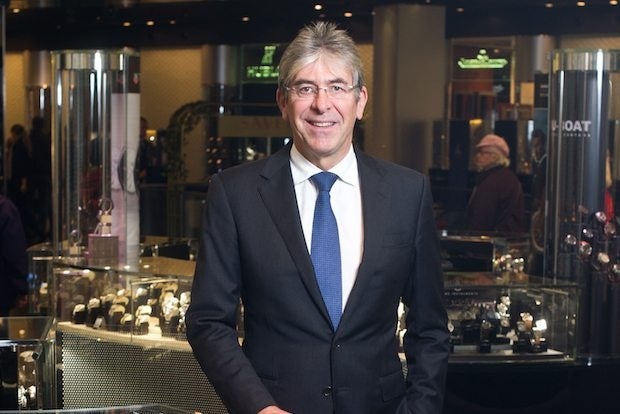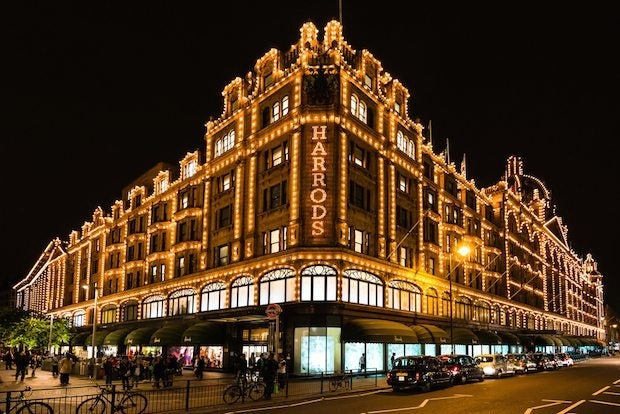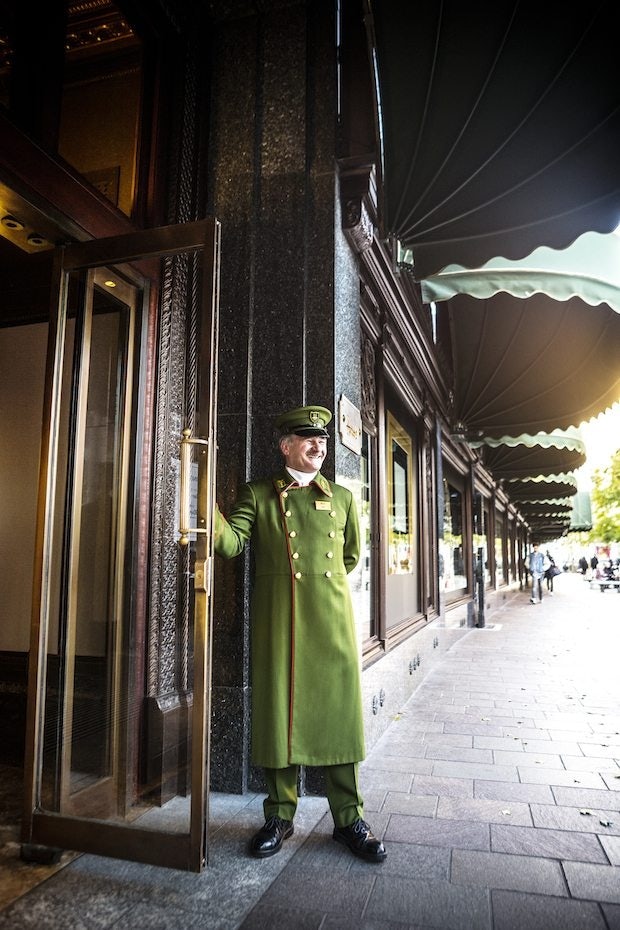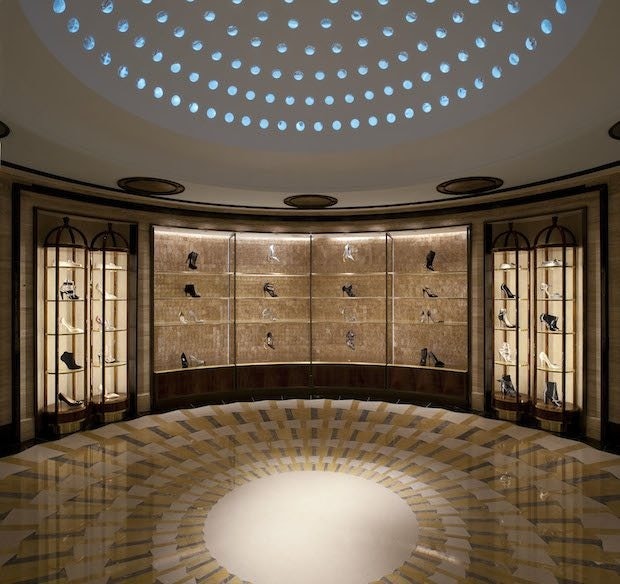
Known as a one-stop shop where the world’s oligarchs can get a $32,000 diamond manicure and pick up a $36,000 bicycle, a Swarovski-studded refrigerator, or a $165 million megayacht, British department store Harrods is one of the most blinged-out shopping destinations in the world—and Chinese travelers have played a big role in keeping its business sparkling in recent years.
Founded in 1834, the store has transformed over the course of its history from a top shopping spot for the British elite to a global destination for the world’s ultra-rich as they visit the city for business and leisure. Chinese tourists make up a big chunk of that business, spending five times as much as Americans, according to Harrods Managing Director Michael Ward.
Thanks in large part to concerted campaigning from British luxury retailers, the UK has recently been working to boost Chinese visitor numbers to encourage even more big-ticket spending. More than 185,000 Chinese travelers visited the UK in 2014, spending an average of £2,688 per visit, according to Visit Britain. But cumbersome visa restrictions have caused the UK to lose out to the EU in attracting more Chinese visitors, which is why new policies such as a joint visa application program with Belgium have been announced over the past year.
But times are changing for China’s ultra-rich, as an ongoing anti-corruption campaign and stock market turmoil have the world’s luxury retailers worried about the future of Chinese demand for luxury, while their well-known love of bling is also in decline.
To learn how Harrods has been responding to these factors, we sat down with Ward in Beijing at the NUO Hotel in Beijing when he was in town for the annual British Polo Day, which promotes British luxury brands in emerging markets and counts Harrods as a top partner. Read below to learn his thoughts about the impacts of China's stock market turmoil, the decline of "gifting" in China, his thoughts on the UK's visa application process for Chinese tourists, and more.
How important are Chinese tourists to Harrods’ overall business?#
Harrods represents 20 percent of the retail spend of the Chinese in the United Kingdom, so it is important for us. Seven years ago, they would be around about a fifth of the American business, and today they are five times the American business. So the Chinese are a very important part for us. That’s about their trust in our brand and their absolute trust in the quality, the originality of the product and goes back to hundreds of years of heritage which has got that natural association with the Chinese.

What kind of growth are you predicting from Chinese tourists in the future?#
At the moment, we’ve had a bit of a plateauing of the Chinese visitor, which we think is a good thing, because it’s starting to be built on the fundamental principles of the brand as opposed to “gifting” principles. And that transition has now happened, so we think there will be continued growth. The population with passports is relatively small and still represents the largest group of international visitors, so I think there’s huge potential in the future. We’ve just got to go through a little bit of a temporary correction.
Do you foresee any effects on Chinese tourist spending from the stock market crash and currency devaluation?#
I think ultimately there must be some impact, but our market is not about small-time corrections. I remember getting the phone calls when Lehman Brothers went in America, and the buyers were saying, “do we collapse our option to buy?” And the answer was “no, we don’t.” This is a long-term game and the luxury consumer—particularly the consumer that we deal with at Harrods—has got much more of a longer-term perspective. Therefore, we see ripples rather than waves.

What are the most effective marketing strategies that you’ve seen so far in reaching Chinese consumers?#
Social media: opinion formers—people who they trust who can give a really valid recommendation of the brand, so we’ve engaged with a lot of people who have that trust in our brand, love the values of that brand, and people trust those observations. We’ve done a lot of social media to get that sort of connection.
How do you feel about the UK’s visa application process for Chinese travelers?#
I think it’s incompetent. Theresa [May] says a lot of good things about what she’s done and what she’s done are the right things to try and move it forward, but it’s effectively scratching at the edges. An association with Belgium is lovely, but they have the least representation in China, and it doesn’t solve the fundamental problem, which is that we still have biometric testing, and the rest of Europe doesn’t have biometric testing. If you look at how many people live within a commutable distance of a biometric testing center, it’s a relatively small proportion of the Chinese population. So what she’s done is right, and it’s good, but basically we still have a fundamental competitive disadvantage.

In terms of Chinese consumers’ tastes and spending habits, ave you seen any kind of evolution in what’s popular with them?#
I think that you always see an evolution of people in the brand. But still, the Chinese have grown up quicker than most nations in terms of what their wants are, and although people start to talk about some of the brands being less or more cool, we’re not seeing disproportionate changes from market with the Chinese population. They are on-trend and they’re following the key brands. It really is they want the best, so we still see the luxury brands being the key things that they are destinational for—particularly in watches, and we’re seeing a greater movement into fine jewelry, so we’re doing a lot of very high transactions now—more in fine jewelry brands as opposed to wanting carats and diamonds.
We’ve also read a lot about the decline of interest in bling and logos among Chinese consumers. Have you noticed anything in terms of that?#
I think the brands themselves have noticed how the logo has become less important, and we’ve now seen major fashion houses which are associated with logos doing fashion shows with no logos whatsoever, so the two actually work in parallel. We’ve seen the fashion houses move away from the heavy logo, and we’ve seen the customer at the same time moving away. I think that sort of concept of the brand that only the person knows is really quite important, and we see the Chinese and the rest of the world moving in that direction.
Does Harrods have any plans to expand into China?#
No, we don’t. I think that for us, Harrods is unique in the world as being one of the true department stores. We still have entire floors for homewares, for furniture, as well as having the world’s best fashion. And that mix of being able to shop across all categories is hugely important for us. To bring that into a city such as Beijing and have 2-, 3-, 400,000 square feet, and providing the levels of service that we require, we don’t think it’s appropriate for this market.